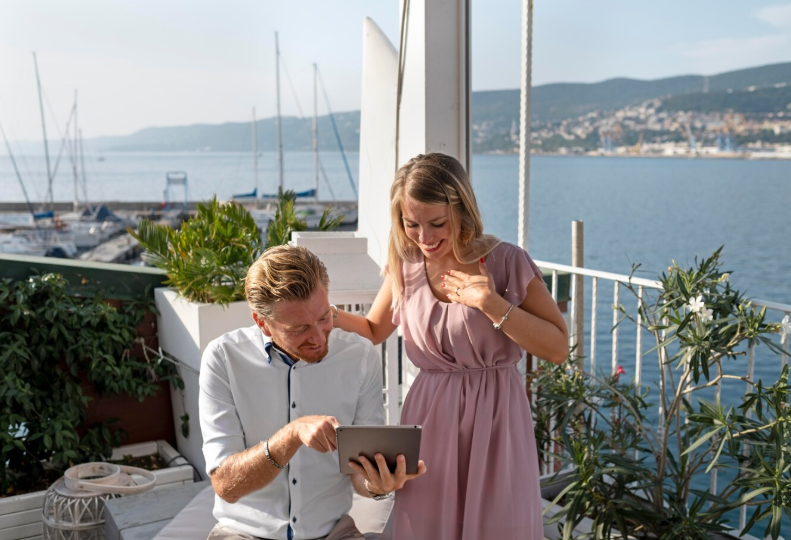
by Dulce Navarro | Jul 21, 2025 | Countries, Europe, Lifestyle, Luxury, Travel
The Ultimate Luxury Travel Guide to Europe: 2025 Edition
Europe continues to be a beacon for luxury travelers in 2025, offering a timeless blend of culture, elegance, innovation, and indulgence. From the fashion houses of Paris to the serene waters of Lake Como, this continent redefines what it means to travel in style. In this comprehensive guide, we explore the most luxurious destinations, experiences, and insider tips to ensure your European getaway is nothing short of exceptional.
1. Paris, France: Elegance and Haute Couture
There is no better place to begin than Paris — the city of light and luxury. In 2025, Paris continues to set global trends in art, fashion, and gastronomy. Start your experience with a private shopping appointment at the iconic maisons of Chanel or Saint Laurent. Stay at the recently renovated Hôtel de Crillon or Cheval Blanc Paris, which offer exquisite views of the Seine and impeccable personal service.
For a culinary experience, book a chef’s table at Guy Savoy or explore Michelin-starred gems like Le Pré Catelan. Don’t miss the exclusive nighttime tour of the Louvre — an unforgettable experience only available to select guests.
2. Lake Como, Italy: Serenity Meets Sophistication
Lake Como remains a quiet sanctuary for luxury travelers. 2025 brings enhanced private boating tours, exclusive villas with helipad access, and curated wine tastings hosted by local sommeliers. Reserve your stay at Villa d’Este or Passalacqua, where personalized concierge service and lakefront views promise total relaxation.
For an immersive cultural escape, attend a private classical concert in one of the historic villas, followed by a candlelit dinner curated by renowned Italian chefs.
3. Santorini, Greece: Sunsets and Sophistication
For a romantic Mediterranean escape, Santorini offers whitewashed villas, infinity pools, and some of the most beautiful sunsets on Earth. In 2025, travelers are booking cliffside suites at Katikies and Canaves Oia Epitome, both known for their privacy and stunning views.
Indulge in a private wine tour through the volcanic vineyards, or charter a luxury catamaran to explore nearby islands and hidden beaches.
4. Zürich, Switzerland: Alpine Luxury with Urban Flair
Switzerland is more than skiing — it’s also a hub for refined elegance. Zürich blends financial prestige with understated luxury. Book a stay at the Dolder Grand, perched above the city with panoramic Alpine views and a world-class spa.
For art lovers, enjoy exclusive entry to the Kunsthaus Zürich or a private tour through galleries in the Old Town. Dining at Maison Manesse offers a creative Michelin-starred experience that pushes culinary boundaries.
5. The Amalfi Coast, Italy: Glamour by the Sea
The Amalfi Coast never loses its charm. In 2025, destinations like Positano, Ravello, and Capri are more curated than ever. Stay at Le Sirenuse or the newly refurbished Belmond Hotel Caruso, where your days will begin with breakfast on a terrace suspended above the sea.
Explore the coast by private yacht, stopping at hidden coves or dining at La Conca del Sogno. The coastline’s natural beauty, combined with historic charm and impeccable hospitality, makes this a must-visit.
6. Insider Tips for Luxury Travelers in 2025
- Book Early: With increased global travel, booking at least 3–6 months in advance is essential for exclusive properties and experiences.
- Utilize Concierge Services: Many luxury hotels now offer AI-enhanced concierge platforms for more efficient, personalized experiences.
- Go Off-Season: Visit top destinations in May or September to enjoy luxury without the crowds.
- Health & Wellness: Many luxury hotels are now offering immersive wellness retreats, with everything from cryotherapy to forest bathing included.
Learning New Languages as an Expat: Strategies for Quick Success
For those embracing the expat lifestyle, learning the local language is both a practical necessity and a powerful tool for deeper cultural immersion. Here are a few strategies for fast-tracked language acquisition in 2025:
- Immersive Learning: Enroll in local classes, participate in language exchanges, or hire a private tutor who offers real-time conversational sessions.
- Daily Practice: Use apps like Babbel, Memrise, or Duolingo — but complement these with real-world conversations.
- Media Exposure: Watch local films or read regional newspapers to get used to slang and expressions.
- Join Community Groups: Expats who engage in local clubs or hobby groups learn faster by using the language in context.
Language isn’t just communication — it’s connection. Whether you’re negotiating in Milan or ordering coffee in a Parisian café, fluency builds bridges wherever you go.
Stay Connected for More Travel and Lifestyle Inspiration. For more insights into travel, culture, and lifestyle tips, follow me on @salvadorordorica. If you’re seeking professional translation and localization services to enhance your global ventures, visit The Spanish Group — your trusted partner in bridging cultures worldwide.

by Dulce Navarro | Jul 18, 2025 | Countries, Europe, Lifestyle, Luxury, Travel
Hidden Luxury: Europe’s Most Underrated High-End Destinations
Introduction
Europe’s luxury travel scene often evokes images of Parisian penthouses, Amalfi Coast villas, or private yachts in the French Riviera. But beyond the well-trodden glamour lies a world of refined, exclusive experiences in destinations that remain surprisingly under the radar. For business leaders and global professionals seeking elegance without crowds, these hidden gems offer a sophisticated alternative to the typical luxury itinerary.
Why Look Beyond the Obvious?
For high-achieving professionals, travel isn’t just leisure—it’s an opportunity for inspiration, cultural enrichment, and global networking. Exploring less-publicized luxury destinations not only ensures privacy and authenticity but often unlocks greater value, personalized service, and rare access to traditions untouched by mass tourism. These locales blend exclusivity with charm and are ideal for those who desire deeper connections with their surroundings.
1. Lake Bohinj, Slovenia
Just 30 minutes from the famed Lake Bled, Lake Bohinj is a serene retreat nestled in Slovenia’s Triglav National Park. Offering alpine luxury without the tourist buzz, Bohinj boasts high-end lodges with spa services, gourmet alpine cuisine, and crystal-clear waters perfect for kayaking or paddleboarding. Winter months bring exclusive access to boutique ski resorts, while the area’s lush trails and horseback riding paths attract nature lovers with a taste for elegance.
2. Menorca, Spain
Often overshadowed by its Balearic neighbors Mallorca and Ibiza, Menorca is a UNESCO Biosphere Reserve with unspoiled beaches, secluded coves, and a slower, more refined pace. The island features luxury agroturismos (rural estates converted into 5-star accommodations), world-class seafood, and some of Spain’s best-preserved archaeological sites. Menorca offers understated elegance—perfect for those seeking luxury without the flash.
3. Kotor, Montenegro
A hidden coastal gem along the Adriatic, Kotor is encircled by mountains and steeped in Venetian charm. Luxury travelers can enjoy superyacht docking in the UNESCO-protected Bay of Kotor, stay in boutique heritage hotels, and savor Montenegrin wines and seafood in cliffside restaurants. The region offers the ambiance of the Amalfi Coast, but with fewer crowds and often at half the price.
4. Puglia, Italy
While Tuscany and the Amalfi Coast capture global attention, insiders know that Puglia—Italy’s southeastern region—is where true Italian luxury quietly thrives. Trulli villas, ancient olive groves, and cliffside Masserias (fortified farmhouses turned luxury stays) define the landscape. Michelin-starred restaurants, pristine beaches, and artisan boutiques create a sensory-rich escape for those seeking authenticity and indulgence in equal measure.
5. Sylt, Germany
Known as the “Hamptons of Germany,” Sylt is a windswept island in the North Sea popular among Europe’s elite. With its thatched-roof villas, gourmet restaurants, and expansive dunes, Sylt offers a unique blend of rustic charm and luxury. The island’s high-end spas and wellness hotels, paired with its exclusive golf clubs and yacht harbors, make it a lesser-known paradise for sophisticated travelers.
6. Valletta, Malta
Valletta, the baroque capital of Malta, is a jewel of the Mediterranean that blends history, luxury, and cosmopolitan flair. Boutique hotels within restored palazzos offer upscale comfort, while private yacht charters allow for island-hopping in style. From rooftop dining with views of the Grand Harbour to art festivals and intimate jazz nights, Valletta delivers charm and prestige without the overwhelming crowds of other southern European capitals.
7. Lofoten Islands, Norway
For those who equate luxury with serenity and natural beauty, the Lofoten Islands are unmatched. Located above the Arctic Circle, this archipelago is home to eco-luxury lodges, Michelin-recognized chefs working with local seafood, and curated excursions like whale watching, midnight sun kayaking, and Northern Lights safaris. Lofoten offers a different kind of opulence—raw, remote, and deeply unforgettable.
Luxury on Your Own Terms
True luxury is no longer defined by brand names or check-in counters—it’s about experience, space, intention, and personal meaning. Whether it’s the tranquil waters of Lake Bohinj, the olive-scented air of Puglia, or the Arctic silence of Lofoten, these destinations cater to those who seek more than just comfort—they seek connection, exclusivity, and the stories less told.
Learning New Languages as an Expat: Strategies for Quick Success
Exploring Europe’s hidden luxury destinations often means engaging with local cultures and languages. As an expat or frequent international traveler, learning a new language can fast-track integration, enhance business relationships, and enrich your overall experience. Start with immersive learning, focus on practical vocabulary, and don’t shy away from making mistakes. Embrace apps with spaced repetition, join local communities, and, if needed, hire a professional language tutor tailored to your goals. Language is your key to unlocking authenticity wherever you go.
Stay Connected for More Travel and Lifestyle Inspiration. For more insights into travel, culture, and lifestyle tips, follow me on Instagram @salvadorordorica. If you’re seeking professional translation and localization services to enhance your global ventures, visit The Spanish Group — your trusted partner in bridging cultures worldwide.

by Dulce Navarro | Jul 17, 2025 | Countries, Europe, Lifestyle, Luxury, Travel
Luxury Vacations in Europe: A Curated Guide for Discerning Travelers
For sophisticated travelers seeking exclusivity, elegance, and authenticity, Europe in 2025 offers an array of refined experiences that redefine luxury. From historic cities to tranquil coastal retreats, each destination is carefully curated to offer the perfect blend of comfort, culture, and curated indulgence. Whether you’re planning your next executive retreat, romantic getaway, or cultural immersion, this guide highlights some of the continent’s most prestigious vacation spots for the discerning elite.
Capri, Italy
The island of Capri continues to embody Italian luxury. In 2025, this Mediterranean jewel is offering private yacht charters, boutique designer shopping, and cliffside dining experiences overlooking the Faraglioni rocks. Stay at the renowned Capri Palace Jumeirah or book an exclusive villa with panoramic views and private staff. The Blue Grotto and Mount Solaro remain must-see highlights, best enjoyed via private tour.
Paris, France
No list is complete without the timeless allure of Paris. For the luxury traveler, Paris offers haute couture shopping, private museum access, and fine dining from some of the world’s top chefs. In 2025, luxury hotels such as Le Bristol, Cheval Blanc, and the Ritz continue to enhance their experiences with tailored wellness programs and art immersion packages. VIP access to Paris Fashion Week and personalized Louvre tours can now be arranged through high-end concierge services.
The Algarve, Portugal
The southern coast of Portugal is rising in prominence among Europe’s luxury destinations. Known for its dramatic cliffs and golden beaches, the Algarve is home to exclusive golf resorts, award-winning spas, and fine seafood dining. Private catamaran charters, bespoke wine tours in Alentejo, and beachfront villas in Vale do Lobo make the region a haven for upscale relaxation.
Vienna, Austria
Vienna masterfully blends imperial history with contemporary elegance. Stay in baroque-style palaces converted into luxury hotels or attend a private opera performance in the city’s world-renowned concert halls. The culinary scene is evolving, with Michelin-starred restaurants offering modern twists on Austrian classics. In 2025, Vienna is also launching curated cultural trails for VIP guests, offering behind-the-scenes access to iconic institutions like the Kunsthistorisches Museum and the Spanish Riding School.
Barcelona, Spain
Barcelona’s rich art and architecture are matched by its growing portfolio of luxury experiences. Think Gaudí-inspired private tours, rooftop dining at five-star hotels, and access to exclusive beach clubs. In 2025, the city has launched elevated culinary journeys that include cooking with Michelin-starred chefs and local ingredient sourcing in La Boqueria. The W Barcelona and Hotel Arts continue to lead the luxury hospitality scene along the Mediterranean coastline.
Courchevel, France
If winter elegance is your style, Courchevel in the French Alps delivers like no other. Home to five-star ski resorts, gourmet chalets, and designer boutiques nestled in the snow, Courchevel offers unmatched alpine luxury. In 2025, luxury snow safaris and private helicopter transfers to the slopes enhance the elite experience. Après-ski takes on new meaning with champagne tastings and in-chalet spa treatments.
Mykonos, Greece
Mykonos remains a magnet for luxury travelers who seek lively beach clubs by day and upscale tranquility by night. Villas with private pools, high-end clubs like Scorpios, and sunset cruises aboard private yachts shape the ultimate Greek island experience. In 2025, new eco-conscious luxury resorts are debuting, focusing on sustainable indulgence without compromising on service or style.
Edinburgh, Scotland
Combining rugged charm with refined taste, Edinburgh offers something unique for the cultured traveler. From castle stays to private whisky tastings, the city is as immersive as it is luxurious. In 2025, new literary-themed retreats and exclusive Highland excursions offer deeper connections to Scotland’s rich heritage. The Balmoral Hotel and Fingal, a luxury floating hotel, are standout accommodations.
Learning New Languages as an Expat: Strategies for Quick Success
One of the most rewarding aspects of living abroad is learning a new language. For expats, mastering the local language can significantly improve integration and overall experience. Begin with intensive language courses focused on daily conversation and professional vocabulary. Apps like Memrise or Tandem can supplement your learning, but nothing replaces real-world practice.
Engage with locals, join community groups, and set practical goals—such as navigating a full day using only the target language. Watching local TV, reading newspapers, and journaling in your new language accelerates familiarity. Above all, be patient with yourself and celebrate small milestones along the way. Language acquisition is a marathon, not a sprint—but it’s one worth running.
Stay Connected for More Travel and Lifestyle Inspiration
For more insights into travel, culture, and lifestyle tips, follow me on Instagram @salvadorordorica. If you’re seeking professional translation and localization services to enhance your global ventures, visit The Spanish Group — your trusted partner in bridging cultures worldwide.

by Dulce Navarro | Jul 16, 2025 | Countries, Europe, Lifestyle, Luxury, Travel
Where Billionaires Vacation in Europe — Revealed
When it comes to luxury travel, Europe offers an unrivaled selection of destinations that cater to the elite. For billionaires, vacations are more than a break—they’re a finely curated experience marked by exclusivity, privacy, and unmatched beauty. From secluded islands to glamorous coastal cities, these are the places where the world’s wealthiest choose to unwind.
1. Lake Como, Italy
Lake Como has long been a favorite among billionaires. Nestled in the Italian Alps, this serene and scenic lake is surrounded by lush gardens, grand villas, and luxury resorts. Celebrities like George Clooney own estates here, and exclusive properties such as Villa d’Este and Mandarin Oriental Lake Como cater to the ultra-rich. Private boating, helicopter arrivals, and fine dining with lakeside views are part of the standard experience.
2. Monaco (Monte Carlo), French Riviera
Monte Carlo is a microstate with macro-level opulence. This tax haven on the French Riviera draws billionaires year-round, thanks to its high-end casinos, luxury yachts, and glamorous events like the Monaco Grand Prix. The Hôtel de Paris Monte-Carlo and Yacht Club de Monaco are favorite haunts, and it’s common to see mega yachts docked just offshore.
3. St. Moritz, Switzerland
For winter luxury, nothing compares to St. Moritz. Known for its world-class skiing, snow polo, and upscale boutiques, this Alpine town is a billionaire magnet during ski season. Visitors stay at the legendary Badrutt’s Palace or Kulm Hotel and enjoy private slopes, exclusive clubs, and fine dining with breathtaking mountain views.
4. Sardinia (Costa Smeralda), Italy
Located on Sardinia’s northeastern coast, Costa Smeralda is a summer sanctuary for the global elite. Known for its pristine beaches, crystal-clear waters, and Mediterranean glamor, the area features resorts like Hotel Cala di Volpe and Pitrizza. Many billionaires arrive by private yacht to dock at Porto Cervo, enjoying bespoke concierge services and unparalleled seclusion.
5. Ibiza, Spain (Private Villas)
While Ibiza is famous for its party scene, its northern regions offer tranquil luxury for the ultra-wealthy. Billionaires frequent private estates, luxury wellness retreats, and members-only beach clubs far from the tourist crowds. Villas in Es Cubells and Talamanca offer panoramic sea views, 24/7 staff, and elite security.
6. Courchevel 1850, France
The most luxurious of the French Alps resorts, Courchevel 1850 offers ski-in/ski-out chalets, private chefs, and luxury boutiques. Part of the Les Trois Vallées, it’s the world’s largest ski area, drawing royalty and billionaires every winter. Michelin-starred restaurants and helicopter transfers only add to the exclusivity.
7. Mykonos, Greece
Known for its iconic whitewashed houses and luxury beach clubs, Mykonos is a favorite summer spot for billionaires. Private villas, yacht charters, and designer shopping await in Psarou and Ornos. Clubs like Scorpios and Nammos cater to an ultra-rich clientele, offering private cabanas and curated experiences.
8. Paris, France
For those seeking a cultured getaway, Paris offers luxury at every turn. Billionaires often stay at palatial hotels like Le Bristol, The Ritz, or the Shangri-La. Private viewings at the Louvre, shopping sprees in Avenue Montaigne, and fine dining at Alain Ducasse are common activities for high-net-worth individuals.
9. Porto Cervo, Italy
Porto Cervo, the capital of Costa Smeralda, is a hub for the billionaire yachting community. This purpose-built village features high-end fashion boutiques, exclusive nightclubs, and waterfront villas. The Billionaire Club, founded by Flavio Briatore, is a staple venue for the ultra-rich during the summer season.
10. Reykjavik & Private Icelandic Retreats
For billionaires seeking seclusion and natural beauty, Iceland is an emerging hotspot. Luxury retreats outside Reykjavik offer complete privacy, geothermal spas, and helicopter tours over glaciers and volcanoes. The Deplar Farm and The Retreat at Blue Lagoon are two of the most exclusive accommodations for a truly unique luxury experience.
Learning New Languages as an Expat: Strategies for Quick Success
Moving abroad offers a world of opportunity—but adapting to a new language and culture is essential for making the most of it. Successful expats embrace the language from day one by immersing themselves in local experiences. Enroll in structured language courses, engage in daily conversations with locals, and use tech tools like Babbel or Duolingo to reinforce vocabulary. Watch local shows, read newspapers, and don’t be afraid to make mistakes. Language learning is not just practical—it’s the key to connection, belonging, and long-term success abroad.
Stay Connected for More Travel and Lifestyle Inspiration. For more insights into travel, culture, and lifestyle tips, follow me on @salvadorordorica. If you’re seeking professional translation and localization services to enhance your global ventures, visit The Spanish Group — your trusted partner in bridging cultures worldwide.

by Dulce Navarro | Jul 16, 2025 | Countries, Europe, Lifestyle, Luxury, Travel
Top 10 Luxury Vacations in Europe That Are Actually Worth the Hype
When it comes to indulging in a luxurious escape, Europe offers a rich tapestry of experiences that cater to the sophisticated traveler. From world-class resorts to exclusive cultural landmarks, this list features the top 10 luxury vacations across the continent that deliver unforgettable experiences and are truly worth the hype.
1. Amalfi Coast, Italy
With its dramatic cliffs, turquoise waters, and charming seaside towns like Positano and Ravello, the Amalfi Coast remains an icon of Mediterranean elegance. Lavish boutique hotels like Le Sirenuse or Hotel Caruso offer exceptional dining, private yacht charters, and access to secluded beaches. It’s a favorite among celebrities and tastemakers for a reason.
2. French Riviera, France
The Côte d’Azur is synonymous with luxury. From the glitz of Monte Carlo to the artistic allure of Saint-Paul-de-Vence, this region delivers sophistication and sun-drenched serenity. Enjoy five-star accommodations at Hotel du Cap-Eden-Roc or the Hotel Negresco in Nice, paired with Michelin-starred cuisine and high-end shopping.
3. Lake Como, Italy
Lake Como blends Italian charm with Alpine majesty. Stay at the opulent Villa d’Este or Mandarin Oriental, Lake Como, where old-world architecture meets world-class amenities. Take a private boat tour of historic villas, enjoy gourmet lakeside dining, or simply relax in peaceful gardens overlooking the water.
4. Santorini, Greece
With its iconic whitewashed buildings and sweeping views of the Aegean, Santorini is the epitome of romantic luxury. The island’s high-end resorts like Canaves Oia Suites and Mystique offer infinity pools, private terraces, and butler service. A sunset dinner paired with local Assyrtiko wine is a must.
5. St. Moritz, Switzerland
Known as the birthplace of Alpine winter tourism, St. Moritz delivers refined adventure. World-class skiing, snow polo, and gourmet après-ski are the norm. Stay at the Kulm Hotel or Badrutt’s Palace and enjoy seamless luxury in one of the world’s most exclusive winter destinations.
6. Paris, France
No luxury list is complete without Paris. The city of lights offers unparalleled cultural richness, fashion, and fine dining. For an ultra-luxe stay, book a suite at The Ritz or Le Meurice. Dine at Alain Ducasse au Plaza Athénée and explore haute couture houses along Avenue Montaigne.
7. Ibiza, Spain
While known for its party scene, Ibiza has emerged as a wellness and luxury haven. Hidden retreats like Six Senses Ibiza and Nobu Hotel Ibiza Bay provide tranquility, spa experiences, and farm-to-table cuisine. Yacht charters and private beach clubs round out the exclusive island lifestyle.
8. Dubrovnik, Croatia
Dubrovnik’s medieval charm and Adriatic beauty make it a rising star in luxury travel. The city’s walled Old Town is a UNESCO World Heritage site, and luxury hotels like Villa Dubrovnik and Hotel Excelsior offer panoramic sea views, private beach access, and historical elegance.
9. Edinburgh, Scotland
For travelers seeking luxury blended with history, Edinburgh offers an exceptional experience. The Balmoral Hotel and Prestonfield House provide exquisite service, while the city offers castle tours, fine whisky tastings, and world-class golf at nearby St Andrews.
10. Porto, Portugal
Often overshadowed by Lisbon, Porto is a hidden gem that’s quietly becoming a luxury hotspot. Enjoy riverside luxury at The Yeatman or Torel Avantgarde, sip vintage port wines, and dine at acclaimed restaurants with stunning Douro River views.
Learning New Languages as an Expat: Strategies for Quick Success
For those embracing life abroad, learning the local language is essential for deeper integration and daily confidence. The key is immersion: engage with locals, take structured classes, and use language apps like Duolingo or Babbel for daily practice. Surround yourself with the culture—watch local TV, read newspapers, and make mistakes without fear. Language is not just about communication, but connection—and the sooner you start, the richer your expat journey will be.
Stay Connected for More Travel and Lifestyle Inspiration. For more insights into travel, culture, and lifestyle tips, follow me on @salvadorordorica. If you’re seeking professional translation and localization services to enhance your global ventures, visit The Spanish Group — your trusted partner in bridging cultures worldwide.

by Dulce Navarro | Jul 15, 2025 | Business, Company, Countries, Culture, Europe, Work
Coworking Spaces in Paris: Top Picks for Remote Professionals
Paris isn’t just the City of Lights—it’s rapidly becoming a global hub for digital nomads, freelancers, and remote professionals. With its seamless blend of history, culture, and cutting-edge innovation, Paris offers more than scenic views and croissants—it delivers world-class coworking environments tailored to today’s mobile professionals. Whether you’re in Paris for a few weeks or planning a longer stay, finding the right coworking space can transform your productivity and professional experience.
Why Choose Coworking in Paris?
Coworking in Paris offers a dynamic environment where creativity, community, and commerce intersect. Remote professionals benefit not only from premium workspaces but also from the cultural richness and connectivity that Paris provides. Most coworking spaces in Paris offer high-speed internet, flexible desk options, networking events, and even wellness amenities. The bilingual nature of many facilities makes it easy for expats and international professionals to integrate smoothly.
Top Coworking Spaces for Remote Professionals in Paris
1. WeWork (Multiple Locations)
WeWork has several strategic locations across Paris, including La Fayette, Champs-Élysées, and Saint-Lazare. Known for its consistent quality and vibrant atmosphere, WeWork offers hot desks, private offices, and conference rooms—perfect for solo professionals or teams. Plus, members gain access to a global network of coworking spaces.
2. Spaces Réaumur
Located in the heart of the 2nd arrondissement, Spaces Réaumur combines stylish interiors with a thriving community of startups, entrepreneurs, and creatives. The facility includes breakout areas, meeting rooms, and a rooftop with spectacular city views. The central location makes it easily accessible by metro and bike.
3. Anticafé (Louvre, Beaubourg, and more)
Anticafé offers a unique coworking model—pay by the hour, and everything else is included: coffee, tea, snacks, and fast Wi-Fi. It’s ideal for freelancers and students who want a cozy yet stimulating environment without long-term commitments. With locations near cultural landmarks, it’s perfect for those wanting to combine work with exploration.
4. Wojo (Gare de Lyon and Locations Throughout Paris)
Wojo blends hotel-level service with the practicality of a professional workspace. Their flexible memberships, high-end design, and focus on wellbeing make it a great fit for consultants, digital creatives, and international remote workers. Daily passes are available, and many locations are open 24/7.
5. Hubsy (République, Saint-Lazare)
Hubsy offers the cozy charm of a Parisian café with the professionalism of a modern office. Their pay-as-you-go coworking model includes unlimited drinks and snacks, with a quiet atmosphere that encourages deep work. Perfect for writers, designers, and anyone needing focused time in a warm environment.
Key Considerations When Choosing a Coworking Space
- Location: Proximity to public transport and vibrant neighborhoods can save time and enhance your experience.
- Amenities: Look for offerings such as ergonomic chairs, phone booths, and printing services.
- Community: Spaces with active event calendars and networking opportunities can open professional doors.
- Flexibility: Choose a coworking model that aligns with your work style—daily passes, part-time memberships, or 24/7 access.
Hidden Gems Worth Discovering
La Permanence
With rates starting as low as €1 per hour, La Permanence is an affordable option for budget-conscious remote workers. Open 24/7, it offers a quiet, no-frills environment ideal for intense study or deep work sessions.
Le Laptop
A favorite among UX designers and digital creatives, Le Laptop offers inspiring interiors and curated community events. Located in the 10th arrondissement, it attracts a crowd focused on innovation and collaboration.
Morning Coworking
Morning Coworking offers various spaces across Paris, including in Montorgueil and Saint-Ouen. Their aesthetically designed workspaces feature natural light, plants, and wellness programming to boost productivity and morale.
Learning New Languages as an Expat: Strategies for Quick Success
Moving to a new country involves more than finding the right place to work—language plays a key role in daily integration and professional success. As an expat in Paris, learning French will greatly enhance your experience and open doors to deeper connections and opportunities.
1. Immerse Yourself
Attend local events, shop in local markets, and practice speaking in everyday situations. Immersion accelerates learning naturally.
2. Take Structured Classes
Enroll in language schools like Alliance Française or take private lessons with a certified tutor. Structured lessons help build grammar and vocabulary fast.
3. Use Language Apps
Duolingo, Babbel, and Tandem can be great for practicing on the go. Many offer conversation exchanges with native speakers.
4. Join Language Meetups
Platforms like Meetup.com host regular language exchange events across Paris, giving you a chance to practice French while helping others with English.
5. Be Patient and Consistent
Language learning is a journey. Celebrate small wins, stay consistent, and don’t be afraid to make mistakes—Parisians appreciate the effort.
Stay Connected for More Travel and Lifestyle Inspiration. For more insights into travel, culture, and lifestyle tips, follow me on Instagram
@salvadorordorica. If you’re seeking professional translation and localization services to enhance your global ventures, visit
The Spanish Group — your trusted partner in bridging cultures worldwide.






